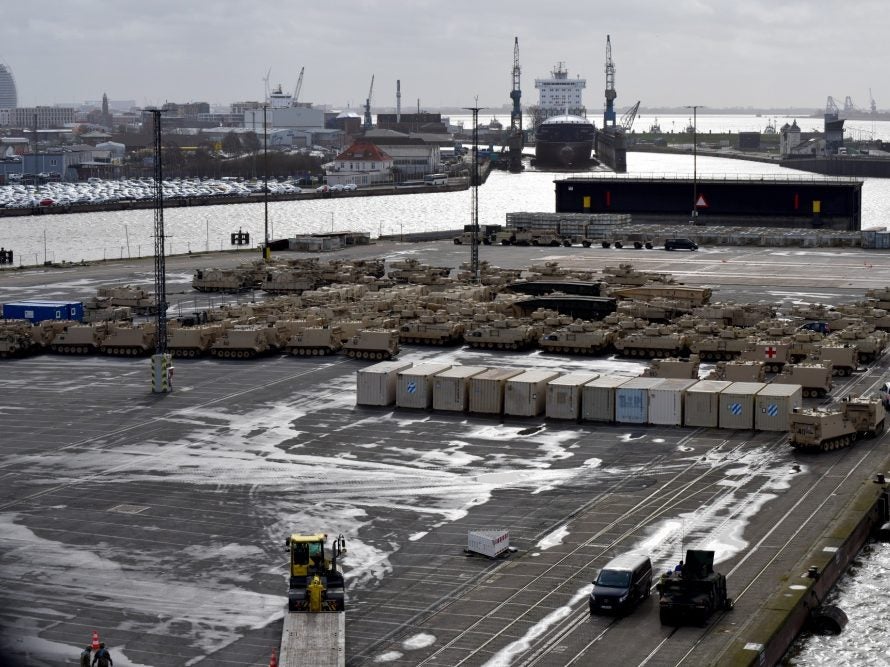
The DoD said that the plan would “achieve core principles” of deterring Russia, strengthening NATO, improving US strategic flexibility and European Command (EUCOM) operational flexibility while prioritising service members and their families.
Seemingly contradicting the DoD, Trump tweeted: “Germany pays Russia billions of dollars a year for Energy, and we are supposed to protect Germany from Russia. What’s that all about? Also, Germany is very delinquent in their 2% fee to NATO. We are therefore moving some troops out of Germany!”

Discover B2B Marketing That Performs
Combine business intelligence and editorial excellence to reach engaged professionals across 36 leading media platforms.
In a statement, Trump added: “We don’t wanna be suckers anymore.”
Speaking to reporters, DoD officials did not explain the withdrawal in the same terms. Instead, they said that the decision was in line with the US National Defense Strategy (NDS), with Defense Secretary Dr Mark T. Esper saying it was “consistent with other adjustments the United States had made within NATO in previous times.”
US European Command and NATO Supreme Allied Commander Europe General Tod Wolters told reporters that the US would be repositioning EUCOM headquarters from Germany to Belgium.
Wolters said: “We also intend to reposition three brigade-sized headquarters, an air defence artillery battalion and an engineering battalion to Belgium from Germany, and two smaller support and contracting organisations to Italy.”

US Tariffs are shifting - will you react or anticipate?
Don’t let policy changes catch you off guard. Stay proactive with real-time data and expert analysis.
By GlobalDataWhile Trump has said the decision to move troops out of Germany was due to the country’s “delinquent” defence spending, Belgium and Italy spend less on defence as a percentage of GDP than Germany’s 1.38%, with Italy spending 1.22% of its GDP and Belgium 0.93%.
Esper added that the withdrawal would cost several billion dollars, but that would be “spread out over time.”
Reaction from the US
The decision attracted bilateral congressional opposition. Senator Mitt Romney (R-Utah) called the plans a “grave error” and a “slap in the face” to the US allies. Romney noted that he had offered an amendment to the National Defense Authorisation Act (NDAA) – which funds the US Military – for the fiscal year 2021 which would reaffirm the US’s relationship with NATO allies and Germany. The amendment was unsuccessful on the Senate floor.
Romney added: “A withdrawal would present serious logistical challenges and prevent our military from performing routine military readiness exercises.”
He urged his fellow congressmen “to take up our measure to prevent such a reduction in troops deployed to Germany.”
Senator Tim Kaine (D-Virginia) said: “With Russian aggression persisting, withdrawing troops from Germany would weaken a key alliance, threaten our national security, and empower US adversaries.”
Senator Jeanne Shaheen (D-New Hampshire) also said the move was detrimental to the US relations with Europe. “The administration’s withdrawal plans would inflict lasting damage to our transatlantic relations and harms our national security.”
Officials from the DoD countered this viewpoint, saying that the new approach of increased rotational forces would strengthen the US’s commitment to Europe. Vice-chair of the Joint Chiefs of Staff, Air Force General John E. Hyten said: “It enhances deterrence and improves operational flexibility.”
Europe responds to US withdrawal
Germany immediately criticised the plan, with the German government coordinator for transatlantic relations Peter Beyer saying on Twitter: “The US troop reduction is not in the security interests of Germany or NATO — and makes no geopolitical sense for the US.” He added: “We need more cooperation to master the future.”
Bavarian Prime Minister Markus Söder has also criticised the US withdrawal decision, adding that it served no clear military purpose and would weaken the NATO alliance and the US itself. “Unfortunately, this puts a burden on the German-American relationship,” Söder said.
Setting out the DoD’s plans, Esper concluded: “Our aim is to implement these moves as expeditiously as possible, consistent with the principles I set forth from the beginning. We could see some moves begin within weeks, others will take longer.”





